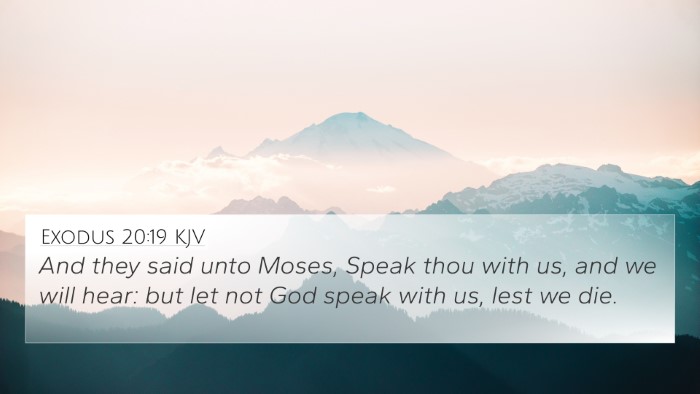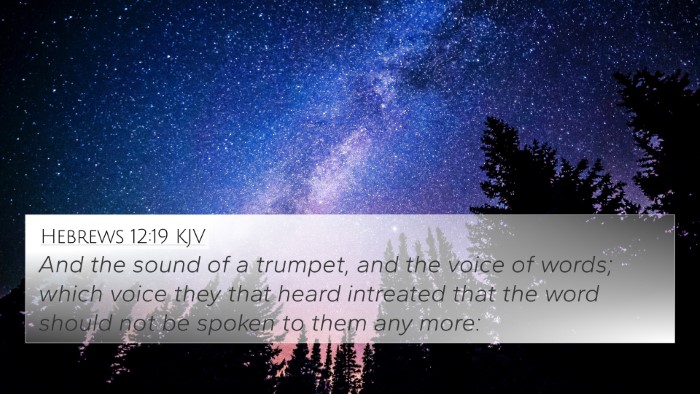Understanding Deuteronomy 5:27
Deuteronomy 5:27 states:
"Go thou near, and hear all that the Lord our God shall say; and speak thou unto us all that the Lord our God shall speak unto thee; and we will hear it, and do it."
Verse Meaning and Insights
This verse is situated within the context of Moses reiterating the covenant between Israel and God. The people are instructed to listen to God's voice and to comply with His commands. The embedded directives in this verse showcase several profound themes that resonate throughout Scripture.
The Call to Listen to God
Moses encourages the Israelites to approach God directly to hear His words. This highlights the importance of being attuned to divine instruction.
- Active Listening: The phrase "Go thou near" signifies an active pursuit of God’s presence and guidance.
- Responsibility to Obey: The community's pledge to "hear it and do it" reflects a shared commitment to live in accordance with God's will.
Covenantal Relationship
This passage underscores the concept of covenant, where God’s laws and the people's obedience form the basis of their relationship.
- Divine Communication: It emphasizes the two-way nature of the relationship—God speaks, and humanity listens.
- Community Engagement: The congregation's response indicates collective responsibility in obeying God's commands.
Connections to Other Scriptures
Deuteronomy 5:27 is interconnected with several other verses throughout the Bible. The practice of cross-referencing yields profound insights into the continuity of God's message:
- Exodus 19:19: "And when the voice of the trumpet sounded long, and waxed louder and louder, Moses spake, and God answered him by a voice." - This establishes the precedent of God speaking to His people, and their response is vital.
- Hebrews 3:15: "While it is said, To day if ye will hear his voice, harden not your hearts, as in the provocation." - This links to the idea of readiness to hear God's instruction.
- James 1:22: "But be ye doers of the word, and not hearers only, deceiving your own selves." - This reinforces the significance of action accompanying listening.
- Psalm 119:11: "Thy word have I hid in mine heart, that I might not sin against thee." - Reflects the importance of internalizing God's words for obedience.
- Romans 10:17: "So then faith cometh by hearing, and hearing by the word of God." - Indicates that listening to God's word is central to faith.
- John 10:27: "My sheep hear my voice, and I know them, and they follow me." - Emphasizes the relationship between the believer and Christ as the Good Shepherd.
- 1 Samuel 15:22: "And Samuel said, Hath the Lord as great delight in burnt offerings and sacrifices, as in obeying the voice of the Lord?" - Illustrating that obedience is more pleasing to God than mere ritual.
Thematic Connections
This verse serves as a keystone in understanding several themes that weave through both the Old and New Testaments:
- The Importance of Obedience: The call to listen and obey resonates throughout biblical texts, establishing obedience as a core requirement of faith.
- Divine Presence: Approaching God to hear His words speaks to the ongoing theme of God's desire to be known and understood by His people.
- Collective Responsibility: The communal aspect of bearing witness to God’s commandments emphasizes that faith is not a solitary journey.
The Role of Prophets
Moses acts here as an intermediary, a role that prophets would continue to play. The connection serves to remind believers of their responsibility toward those who proclaim God’s word.
- Listening to God's Messengers: Just as the Israelites were called to listen to Moses, modern believers are also tasked with listening to God’s appointed leaders.
- Importance of Authentic Interpretation: Ensuring that the interpretations of God’s word remain true to its original intent is essential.
Conclusion and Reflection
Deuteronomy 5:27 invites believers not just to hear but to actively engage with God's word. Through the encouragement to approach God and to heed His voice, Moses sets a foundational principle that echoes through Scripture and into the hearts of believers today. Understanding this verse within the broader biblical narrative enriches our practice of faith and our ability to connect with God.
Tools for Cross-Referencing
For those looking to study cross-references more effectively, utilizing a Bible concordance or a cross-reference guide can greatly enhance one’s understanding and study of biblical texts. Such resources help identify connections between verses and provide a deeper appreciation for how Scripture interprets itself.
Further Studies
As you explore this verse further, consider how it connects to your spiritual journey and the verses that resonate with you personally. Engaging in cross-referencing Bible study methods can unveil new insights and strengthen your faith.




